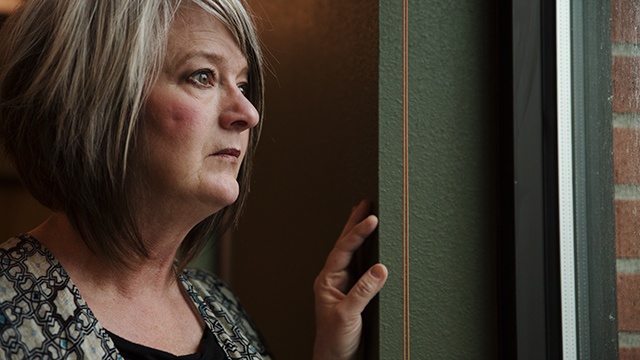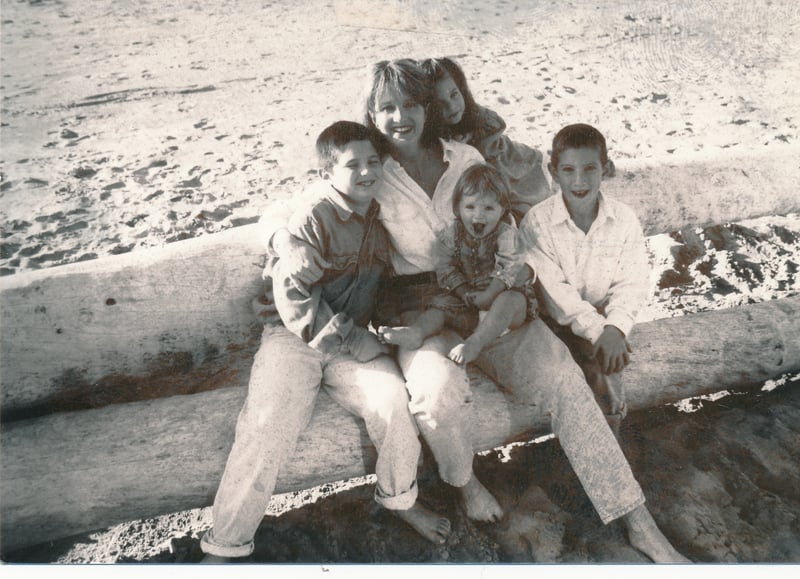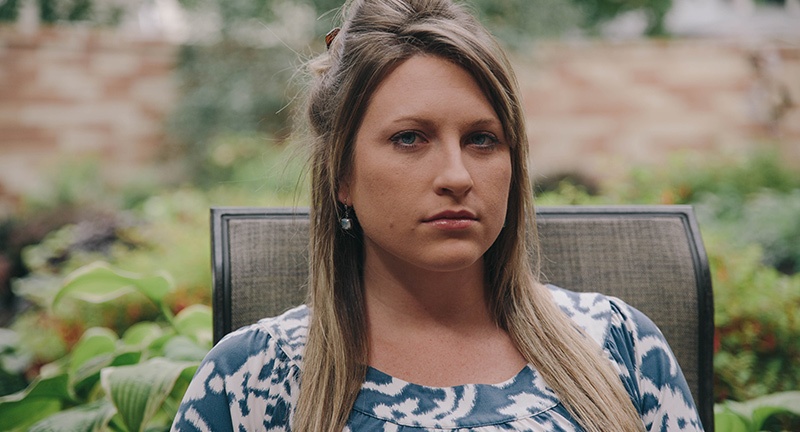2 min read
Gospel-Centered from the Start
“Let us hold unswervingly to the hope we profess, for He Who promised is faithful…Jesus Christ is the same yesterday, today, and forever.” (Hebrews...
By Barbara Comito, Director of Marketing & Communications
I once interviewed a teenager who described her depression as a “blanket on the brain.” The metaphor is nearly perfect as it relates to my experience. Depression is an oppressive, suffocating sort of blanket that blurs all the edges.
When my depression flares, rational thought becomes difficult. I cannot grasp what I know to be true, especially in the middle of the night. My faith, the love of my family, my multiple blessings … all seem lost in the darkness that threatens to swallow me.

A common misconception is that depression equals sadness, and while there is certainly overlap, the equation limits understanding.
Sadness is an emotion. Depression is a disease.
Sadness is generally triggered by circumstances. Depression can affect a person regardless of circumstances.
Sadness is normal. “Depression is an abnormal emotional state, a mental illness that affects thinking, emotions, perceptions and behaviors in pervasive and chronic ways. When we’re depressed, we feel sad about everything.” (Psychology Today)
We’re inclined to comfort people who are sad. They are often going through some type of loss, and that makes sense to us. We bring flowers and meals. We send cards. We anticipate an end to their sadness. We have no idea what to do with people who are depressed.
Hence, the silence.
“The biggest problem in our churches related to matters of mental health and mental disorders is silence” – Jeremiah Johnston, founder of Christian Thinkers Society, in an article for Relevant magazine, “The Church of Invisible Diseases.”
I have mixed emotions with regard to speaking out about my depression. On the one hand, I see it as a valuable means of breaking down the barriers between “us and them” – the people who work at UGM and the people who come here seeking help. I cannot count the number of interviews I’ve done where a suicide attempt – direct or indirect – precipitated the person coming to one of UGM’s shelters. Death wish by alcohol poisoning, overdose or slit wrists – they all add up to the same thing – despair. I have thought, again and again, you are not alone. And I am a big believer that not being alone matters.
Although I am managing my depression, I can very much relate to feelings of hopelessness and inadequacy, of wanting to escape by any means possible. Those feelings bind me to the people UGM serves, and our mutual brokenness is fundamental. Otherwise, we are in danger of becoming like the Pharisee who thanks God he is not like the publican praying next to him or the older brother who sees himself as superior to his wayward brother.
Jesus said it is the sick who need a doctor. I am sick.
On the other hand, this public revelation makes me more vulnerable than I feel comfortable being. Will people look at me differently? Think they must tread lightly, handle me with kid gloves? Will my bosses think I can’t handle the responsibility, the stress? That I’m not fit to lead?
Ultimately, the choice to speak out comes down to this for me: “But he said to me, ‘My grace is sufficient for you, for my power is made perfect in weakness.’ Therefore I will boast all the more gladly about my weaknesses, so that Christ's power may rest on me.” (2 Corinthians 12:9)
I was first diagnosed with clinical depression in my early 30s. At 38, I experienced my first (and, to date, only) debilitating episode or emotional breakdown.
I was living on the Oregon Coast at the time. I had an 11-month-old baby and three more children under 8. I was homeschooling. My husband, a chef, was opening a new restaurant.
 I entered a two-week intensive treatment program through New Life Clinic, based on the psychiatric ward of a Seattle hospital. The timing wasn’t great, but I had called a suicide hotline, and while I argued that I couldn’t leave my children, they argued that, for my children’s sake, I must.
I entered a two-week intensive treatment program through New Life Clinic, based on the psychiatric ward of a Seattle hospital. The timing wasn’t great, but I had called a suicide hotline, and while I argued that I couldn’t leave my children, they argued that, for my children’s sake, I must.
I sat with a man who had blown half his face off in a suicide attempt, a woman who showered her skin raw in an attempt to wash away her affairs, a man who sat in wait for his ex-wife with a loaded shotgun.
Honestly, at first, I thought maybe I needed the intermediate class. I had (and still have) a husband who loved me and four beautiful children. I was, by all appearances, functioning normally. I had a perfect little life.
And that’s when the irony hit me. I had a perfect little life that I wanted to escape. Something was wrong with my brain. I needed help.
Those two weeks consisted of intense cognitive therapy based on a Christian worldview, group sessions, individual counseling, medication assessments, nutrition, exercise, quiet time with God – all with the goal of reshaping my approach to life. We took a deep dive into the beliefs that led me to that point, and the counselors pointed out where my thinking was perfectionistic and pharisaical. In fact, when it was time to go home, I told them I was scared I would get it wrong, and they said, “Can you see that, even in this, you are trying to do it perfectly?”
Of course, I didn’t do it perfectly, and of course, I was not “cured” in two weeks. But I do point to that time as a turning point. I see my depression as a disease that has to be managed – much like my daughter’s diabetes. I must be vigilant and put on the armor God has provided me – every day. (More about that in an upcoming post, “My Personal Suicide Prevention Plan.”)
Thankfully, I work for an organization that operates on the foundation of the gospel and emphasizes the importance of transformation in all our lives – residents, staff and volunteers alike. UGM functions under the umbrella of grace and invites authenticity. I still need to do my job, and there’s plenty of emphasis on measurable outcomes and performance, but nobody is expecting me to be perfect. And all around me, there are people working on their stuff, so I fit right in.
In closing, I’m going to share a poem I wrote: Partly because it provides insight into my struggle to get out of my head, but partly because I’ve come to see there is an upside to my personality. I am a creative, and I share this mental health struggle with plenty of other creatives – many of whom have left the world a more beautiful place.
My head sits
smack in the middle of my chest
Displaced
my heart whispers unintelligibly
somewhere
in the midst of the broken geometry.
One eye triples the size
of the other what with straining
to see
clearly.
I am a Picasso.
A mystery to myself.
I want to be a Van Gogh.
Brilliant gold sunflowers and
black blue skies
reverberating starry starry
an inviting outdoor cafe.
Come
lunch with me in one
beyond-natural celebration of all
that is true and beautiful.
I want to be a Van Gogh.
Understanding their unique God-given qualities is one key to seeing others as they really are rather than hastily categorizing them under a label: "depressed," "addicted," "homeless," etc. Click below to get your free "Lose the Label" study guide.

2 min read
“Let us hold unswervingly to the hope we profess, for He Who promised is faithful…Jesus Christ is the same yesterday, today, and forever.” (Hebrews...

9 min read
To celebrate 75 years of serving the Inland Northwest, we are spending the year remembering our history and the faithfulness that built us and...

2 min read
In 2026, Union Gospel Mission Inland Northwest is approaching our 75th Anniversary! This is a milestone that invites gratitude and reflection, and...

Depression is common among those beginning recovery at UGM. In the first part of an interview with Jan Vetter, UGM LIFE Recovery Counselor, Jan sheds...

By Merrily Brast, Staff Writer “My whole life, I was super angry, and I used to always think everybody would be better off without me.”

I came to Anna Ogden Hall in May 2017, just so broken. I didn’t think I could get more broken. I was like no smile at all. I would cry all the time...